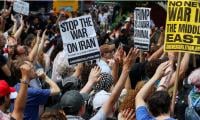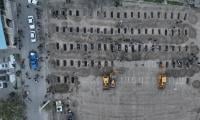Pildat assesses NAP’s implementation in Punjab
LAHORE: Performance of the Punjab government on the implementation of National Action Plan has witnessed a slight downward trend during third quarter of 2017. This was shared by Pildat fourth quarterly monitor on the implementation of National Action Plan on counter-terrorism in Punjab in a public forum held here.
Former governor of Sindh Lt-Gen (R) Moinuddin Haider, former governor of Punjab Shahid Hamid, former interior secretary Tasneem Noorani, journalist Mujeeb-ur-Rahman Shami, former secretary Tariq Pervez, former national coordinator, NACTA, former DG of FIA and Ahmed Bilal Mehboob, President Pildat addressed the forum.
This 4th quarterly monitor on implementation of NAP in Punjab is a continuation of periodic monitoring of implementation of National Action Plan that PILDAT began in January 2017 (Given the importance of the 20-point consensus-based NAP in countering terrorism in Pakistan, PILDAT has undertaken a citizens’ initiative to monitor the progress of implementation of the NAP based on publicly available data). Ahmed Bilal Mehboob explained that during the third quarter of 2017, of the 15 NAP points pertaining to the performance of Punjab on the implementation of the National Action Plan, two NAP points (No 6, which relates to choking terrorist financing, and No 11, which relates to ban on glorification of terrorists through media have shown upward progress), while 3 NAP points (No 7, which relates to ensuring against re-emergence of proscribed organisations, No 13 which relates to the dismantling of terrorist networks and No 15 which calls for zero-tolerance for militancy in Punjab have shown a regression in their status of implementation). PILDAT has not given assessment of status of implementation of NAP Point No 1 (implementation of death sentence to terrorism convicts) and No 2 (constitution of military courts) due to insufficient data.
The remaining 8 NAP points reflect consistent implementation levels during the third quarter of 2017, as compared to the second quarter. Speaking at the occasion, Tariq Pervez stated there has been very little transparency in the manner that National Action Plan has been implemented. Many executions have taken place since the moratorium on death penalty was lifted on the pretext of fighting terrorism, but very few of those executed were actually terrorists. He stated that NACTA is the agency tasked with co-ordination of counter-terrorism efforts, but the government has not made NACTA a priority. He argued that the implementation of NAP points on action against religious persecution, hate literature, terrorist financing and re-emergence of proscribed organisations was less than satisfactory.
There is also little information about the criteria used to forward cases to military courts. Tasneem Noorani opined that while PILDAT’s quarterly assessment of NAP’s implementation was rigorous, it appears that the National Action Plan is no longer a priority for the government, highlighting implementation of NAP as unsatisfactory on all points.
Shahid Hamid stated that writ of the state has declined because of recent incidents in the country, which was a worrying trend. He stated that it is in fact NACTA and the provincial governments who should be providing periodic reports on NAP.
Mujib-ur-Rahman Shami stated that the Faizabad incident proves that strict implementation of NAP also leads to a backlash and has political costs associated with it. It is therefore imperative that all political forces come together with the government to work on this crucial issue. Military courts are not the answer and instead there is an urgent need to close the communication gap between the executive and the judiciary for better implementation of NAP.
Lt-General (r) Moinuddin Haider stated that many attempts at reforms had taken place in the recent years, but they usually fall through at the implementation stage e.g. the proposed Fata reforms. He added that the focus of political debates recently has not been counter-terrorism, but Panama Leaks.
-
 Pink Breaks Silence On Major Speculations About New Career Direction
Pink Breaks Silence On Major Speculations About New Career Direction -
 Andrew Gets Unexpected Visit From Senior Palace Official
Andrew Gets Unexpected Visit From Senior Palace Official -
 Bill Clinton's 'wicked Smile' From Epstein Testimony Goes Viral
Bill Clinton's 'wicked Smile' From Epstein Testimony Goes Viral -
 Who Becomes Duke Of York After Andrew Mountbatten-Windsor?
Who Becomes Duke Of York After Andrew Mountbatten-Windsor? -
 Christa Miller Teases 'Scrubs' Finale, Weighs In On Streaming Vs Network TV
Christa Miller Teases 'Scrubs' Finale, Weighs In On Streaming Vs Network TV -
 Prince William, Kate Middleton Share Powerful Message On World Wildlife Day
Prince William, Kate Middleton Share Powerful Message On World Wildlife Day -
 Mexico Buries Jalisco Cartel Chief El Mencho As Military Crackdown Continues
Mexico Buries Jalisco Cartel Chief El Mencho As Military Crackdown Continues -
 Kris Jenner Issues Final Verdict About Kanye West’s Future With The Kardashians
Kris Jenner Issues Final Verdict About Kanye West’s Future With The Kardashians -
 Ringo Starr Begins Bold New Chapter At 85
Ringo Starr Begins Bold New Chapter At 85 -
 What You Should Know Before Asking An AI Chatbot About Your Health
What You Should Know Before Asking An AI Chatbot About Your Health -
 Kris Jenner 'plays Nice' To Kanye West Only For Daughter Kim Kardashian's 'sake'
Kris Jenner 'plays Nice' To Kanye West Only For Daughter Kim Kardashian's 'sake' -
 Sarah Ferguson Is 'absolutely Terrified'
Sarah Ferguson Is 'absolutely Terrified' -
 Lauren Boebert: Lawmaker Behind Hillary Clinton's Leaked Photo Gets Roasted Over Definition Of Inflation
Lauren Boebert: Lawmaker Behind Hillary Clinton's Leaked Photo Gets Roasted Over Definition Of Inflation -
 Plane Crashes Into Icy Hudson River Near New York, Two Survive
Plane Crashes Into Icy Hudson River Near New York, Two Survive -
 Princess Dies At 73 After 'long Illness'
Princess Dies At 73 After 'long Illness' -
 Polls Show Most Americans Oppose Recent US Strikes On Iran
Polls Show Most Americans Oppose Recent US Strikes On Iran



